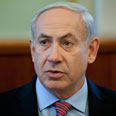
Official: Cabinet hasn’t discussed Iran since October
Israeli official tells Reuters forum of eight ministers hasn't held proper discussion on strike for months, adds one can't make concrete decisions 'on the sidelines of a different agenda'
Prime Minister Benjamin Netanyahu and Defense Minister Ehud Barak conveyed the message to US Defense Secretary Leon Panetta this week that Israel will decide for itself how to handle the nuclear threat and according to various report the two are planning an Israeli strike on Iran's nuclear facilities. However, a Reuters report suggests that the forum of eight ministers had not discussed the matter in almost a year.
"The octet hasn't held a proper discussion of Iran for months - since October, as far as I can recall," said an Israeli official, who had been briefed on the closed-door sessions.
Related stories:
- Op-ed: It won’t work without the Americans
- Iran: US suffers recession
- Netanyahu to Panetta: Time is running out
"It's possible that, since then, Iran came up during other sessions, but I wouldn't count those as serious discussions. You can't make any concrete decisions or policy advances in an hour-long chat on the sidelines of a different agenda."
In addition, the official said the forum remained split on the issue, while Israel's top military and intelligence echelon were "entirely against" launching a unilateral strike on distant and well-fortified Iranian targets that would pose an unprecedented challenge to their forces.

Netanyahu and Barak. Missing majority for strike (Photo: Yaron Brener)
According to various reports, four ministers oppose the strike: Moshe Ya'alon, Benny Begin, Dan Meridor and Eli Yishai, while Netanyahu, Barak, Avigdor Lieberman and Yuval Steinitz favor a military operation.
Some believe that Netanyahu had joined forces with Shaul Mofaz to form a unity government in the hopes of securing his support on Iran, but the latter ultimately remain unchanged in his objection to a strike. This left Netanyahu without a majority to okay his plans.
Government spokesman Mark Regev declined to comment on the octet discussions. "This is a confidential forum," he said.
Meanwhile, The New York Times quoted US officials as saying that "Israeli officials are less confrontational in private… PM Netanyahu understands the consequences of military action for Israel, the United States and the region."
Several officials told the paper that they still hope Israel has no immediate plans for a strike and is ready to let the US take the lead in any possible military operation, which they believe may take place no sooner than early 2013.
Washington allegedly sent Panetta and National Security Advisor Tom Donilon to Israel to prevent a strike before November.
Former Mossad chief Efraim Halevy told the paper, "If I were an Iranian, I would be very fearful of the next 12 weeks." According to the report, Halevy based his assumption on Israel's aversion of winter battles, Netanyahu's fears of dwindling support should US President Barack Obama be elected for a second term and the fact that should GOP candidate Mitt Romney be elected president, he is likely to shy away from starting his term in office with a war.
- Receive Ynetnews updates directly to your desktop










